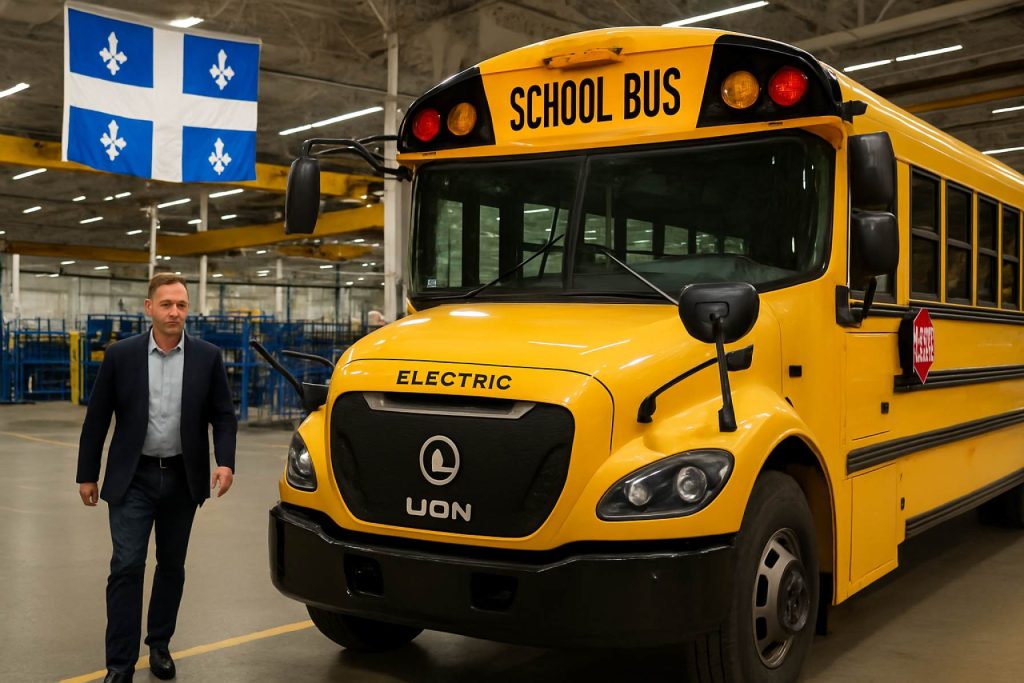
- Lion Electric faced severe financial challenges, with debts reaching $250 million and layoffs impacting operations in both Canada and the U.S.
- School districts experienced undelivered and inoperable electric buses, while legal investigations into securities violations intensified investor concerns.
- Quebec’s government revitalized electric vehicle incentives, offering up to $240,000 per school bus—boosting demand and giving Lion Electric a crucial market edge over American competitors.
- Lion Electric now supplies 1,200 of Quebec’s 1,600 electric school buses, and the new subsidies are expected to solidify market dominance and stabilize employment at its St-Jérôme facility.
- Major Quebec investors are injecting new capital, signaling restored confidence as Lion Electric navigates ongoing legal and reputational challenges in the electric vehicle market.
Just yesterday, Lion Electric teetered at the edge. Now, with Quebec’s government throwing a financial lifeline, the future of this embattled electric vehicle pioneer pulses with unexpected possibility.
At the heart of Quebec’s bustling streets, Lion Electric’s signature yellow school buses have come to symbolize a vision: zero-emission, homegrown vehicles ferrying the next generation through neighborhoods still touched by winter’s bite. But as the market cooled, Lion’s losses mounted. Debts soared to a staggering $250 million, triggering layoffs in both Canada and the United States, and leaving entire school districts grappling with undelivered promises and silent, inoperable buses.
Legal storm clouds gathered. Renowned shareholder rights firms in New York circled, investigating potential securities violations. Confidence, already shaken, began to erode across investor circles.
Yet, in a stunning reversal, Quebec’s government reinstated and dramatically sweetened its electric school bus rebate. The new program pushes potential incentives for each Lion bus to a striking $240,000—nearly 40% higher than before. Electric bus demand is poised for a tectonic shift, especially as trade policies threaten to inflate prices of American-made alternatives like Blue Bird and Thomas Built, giving Lion a crucial edge.
Across Quebec, Lion already dominates with 1,200 out of 1,600 electric school buses displaying its emblem. The new subsidy could cement this lead, catalyzing sales throughout the province and injecting much-needed cash into Lion’s coffers. For the workers in St-Jérôme, where Lion maintains its Canadian production hub, hope glimmers anew. Unlike the Illinois plant—shuttered for now—this homegrown facility will keep humming.
Major Quebec investors, sensing the subtle turn in fortunes, have started to infuse fresh capital. The exact sums remain under wraps, but the move signals renewed faith in Lion’s survival—even as complex lawsuits and regulatory inquiries loom.
The lesson? Industry salvation often arrives not as a single thunderclap, but in a cascade of decisions—a government incentive, a strategic cash injection, a community’s decision to keep rolling the dice on innovation. As Lion Electric fights through lingering legal battles and strives to repair its tarnished reputation, Quebec’s bold support reveals something vital: in the electrification race, local champions may be battered, but with the right currents, they can still roar back to life.
For more on cutting-edge technology, sustainable transit trends, and major Canadian business stories, visit CBC.
Lion Electric’s Surprising Bounce Back: What Quebec’s $240k School Bus Rebate Means for the EV Industry—And You
The Lion Electric Turnaround: What More You Need to Know
Lion Electric, once teetering on the brink of financial collapse, has staged a dramatic comeback thanks to robust government intervention. While recent headlines highlighted Quebec’s generous new subsidy and Lion’s temporary troubles, there’s far more beneath the surface. Here’s a comprehensive look at additional facts, critical analysis, and actionable insights every EV industry watcher, investor, and school district decision-maker should know—backed by trusted expertise and the latest trends.
—
What Else Is At Stake? Unpacking the Lion Electric Story
1. Why Lion Electric Matters to the EV Transition
Lion Electric isn’t just another electric vehicle company. It stands as Canada’s largest manufacturer of medium and heavy-duty electric vehicles, with an increasing presence in the United States. Lion’s product portfolio includes all-electric school buses, minibuses, and commercial trucks, designed specifically for North American climates—where winter performance and range matter greatly (source: Financial Post, Lion Electric).
2. How Lion Electric’s Rebate Compares, In Detail
– Previous rebate: $150,000 per bus, subject to budget constraints.
– New maximum rebate: $240,000 per bus—nearly half the cost of a new LionC bus.
– Competitive edge: American options like Blue Bird and Thomas Built face both higher MSRP and trade penalties, potentially making Lion’s local buses the most affordable option in Quebec.
3. The North American Electric Bus Landscape
– Market size: The U.S. has about 480,000 school buses in operation but only 2,000+ electric; Canada’s electric market is smaller but growing rapidly.
– Major players: In addition to Lion, Blue Bird, Thomas Built, and GreenPower are direct competitors. Lion leads Quebec and ranks among the top in North America for all-electric school buses.
– Growth forecasts: Electric school bus sales in North America are projected to grow at a compound annual rate of over 28% from 2023 to 2030 (ResearchAndMarkets.com).
4. Supply Chain Resilience & Local Production
– Why St-Jérôme matters: Lion’s plant in Quebec remains operational, sustaining hundreds of skilled jobs. By producing locally, Lion minimizes logistical delays, currency risk, and supply chain shocks. In contrast, the shutdown of its Illinois plant reflects the precarious state of U.S. expansion.
5. Legal & Investor Watch—What’s Next?
– Ongoing investigations: U.S. law firms are probing potential securities violations, reflecting shareholder discontent after missed delivery targets and financial restatements in 2023 (source: GlobeNewswire).
– Investor sentiment: With major Quebec pension funds reportedly back in, Lion has a crucial runway—but it must restore transparency and meet performance targets.
—
Pressing Questions You Should Be Asking
Is an electric bus really THAT much better?
– yes: Zero tailpipe emissions dramatically improve air quality for students. According to the U.S. EPA, diesel buses emit particulates linked to asthma and cognitive impairment.
– Savings: Lion estimates districts can save up to 80% on fuel and 60% on maintenance over 15 years.
– Limitation: Upfront costs remain steep—even with subsidies—a challenge for smaller municipalities.
What about charging infrastructure?
– Progress: Canada has launched federal support programs like ZEVIP (Zero Emission Vehicle Infrastructure Program). Lion also offers turnkey charging solutions.
– Challenge: Older depots require expensive electrical upgrades; planning is essential.
Are Lion buses really “winter-proof”?
– yes: Lion Electric’s buses are equipped with advanced battery thermal management systems, designed and tested specifically for Canadian winters.
– Caveat: Extreme cold can still reduce range by up to 20%, so route planning and pre-conditioning are needed.
—
Real-World Use Cases & How-To Steps
For School Districts Considering Electric Buses:
1. Conduct a fleet audit: Evaluate current routes for suitability (range, charging needs).
2. Engage with provincial and federal funding agencies: Leverage Quebec’s new rebate and federal incentives.
3. Plan infrastructure: Partner early with utilities and Lion’s charging solution team.
4. Prepare for transition: Educate drivers and mechanics on differences in operation and safety.
—
Reviews, Pros & Cons, and Comparisons
Pros:
– Leading cold-weather performance
– Local manufacturing minimizes lead times
– High resale value and robust after-sales support in Quebec
Cons:
– Litigation risk and reputational hangover
– Relatively high upfront cost without incentives
– Uncertainty in U.S. expansion
Review consensus: Fleet deployments in Quebec report high driver satisfaction and drastically reduced operating costs, but smaller U.S. customers cite wait times and communication gaps as pain points.
—
Industry Trends, Insights & Predictions
– More provinces, more rebates: Expect other provinces/states to follow Quebec with aggressive incentives to meet climate targets.
– Consolidation: The crowded EV bus market is likely to consolidate; companies with strong local backing (like Lion) are best positioned to survive.
– Battery innovation: Watch for Lion to adopt next-gen battery chemistry to further boost winter range and cut costs.
—
Actionable Recommendations & Quick Tips
– School Districts: Act quickly to secure 2024-25 rebate funding; early applicants often receive priority.
– Investors: Monitor cash burn rate and pending legal outcomes before revisiting Lion Electric stock.
– Policymakers: Support not just bus acquisition, but also infrastructure grants and workforce training for a smooth transition.
—
Conclusion: Why Lion’s Revival Is Bigger Than One Company
The dramatic reversal of Lion Electric’s fortunes underscores the mix of risk and opportunity in the electric vehicle revolution. Quebec’s bold policy not only gives Lion a second chance but sends a message: local manufacturing, job creation, and climate action are strongest when aligned. For anyone invested in the future of sustainable transit, Lion Electric is a bellwether worth watching.
For more leading-edge stories on technology, transportation, and Canadian business, visit CBC.



